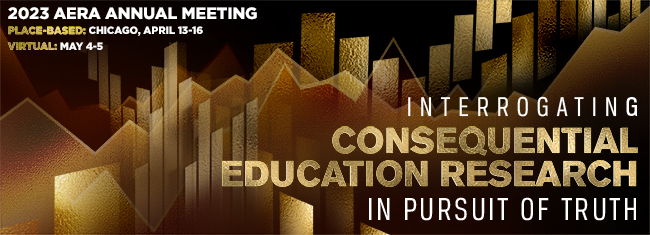
Interrogating Consequential Education Research in Pursuit of Truth
H. Richard Milner, IV
President
president@aera.net
Chicago, IL, and Virtual Platform
Place-Based in Chicago: April 13–16, 2023 | Virtual: May 4–5, 2023
Call for Submissions: June 1–August 1, 2022 (extended from July 27)
What is “truth” and who decides? From what evidence, if any, do people construct their positions about truth as they make decisions concerning education? Education research is too often absent, underrepresented, misinterpreted, under-nuanced, and decontextualized in broader, societal, and public conversations about educational issues in pursuit of truth. From what research and evidence do people consult when making decisions about banning and censoring books and curriculum materials? How do people interpret education research when making policy judgements about Critical Race Theory and its potential effects? From what data repositories do people engage in making a case for what history is and is not taught in schools? When education research is considered, the implications and outcomes for marginalized communities can be harmful or beneficial. In pursuit of truth, education research needs to be (a) designed to matter in public policy and practice and, concurrently, (b) interrogated to ensure equitable processes and results.
Education research should be positioned as a necessary site in deliberations and practices. Instead of being reactive to educational problems or to social movements designed to maintain an inequitable status quo, education research can (and should) be at the center of co-constructing with communities agendas of consequence that have a real bearing on disrupting ableism, racism, sexism, homophobia, xenophobia, and other forms of discrimination[1].
To be clear, education research that is taken up has been consequential in societal decision making. However, the recommendations, implications and insights garnered from research must be interrogated in pursuit of truth to avoid and/or disrupt attempts to stifle progress toward justice and equity. Without deep, sustained, and systematic interrogation, we may not advance humanizing, opportunity centered projects of impactful consequence.
Accordingly, the 2022–2023 Annual Meeting theme is "Interrogating Consequential Education Research in Pursuit of Truth." The theme has an intentional intellectual, dialogic, and practical focus. In particular, I invite colleagues to push the boundaries of ideas, methods, and collaborations in preparing paper or session submissions. We welcome innovations and novelty in studying and advancing quality consequential research.
- Develop careful, detailed, systematic and analytic literature reviews. I hope colleagues will critically analyze existing consequential education research and scholarship over the years, drawing from diverse conceptual and theoretical tools to explain and make sense of the literature. The reviews should identify themes and patterns that we might revisit with an intentional focus on equity, justice, and opportunity structure.
- Identify essential sites for empirical research and engage dialogically with communities in the design and carrying out of studies.
- Identify, forward, critique, and utilize multiple modes for communicating findings of consequential education research.
- Prepare a paper or organize a symposium that focuses on creating space for analysis and discussion designed to interrogate and advance methods, mechanisms and practices that name injustice and co-construct opportunities for just educational processes and systems.
Moreover, I invite colleagues at all career stages, from graduate students to those more settled in their career lines, to push traditional modes of sharing findings, themes, and insights from research in pursuit of truth with consequence. This means education researchers are invited to examine and critique traditional modalities and repositories while recommending and utilizing alternative modes. Examples of alternative modes of research dissemination include blog posts, poetry, data-rich opinion essays, social media commentaries, music, short films, YouTube clips, and newspaper articles.
We need also to have venues and outlets that are receptive to these modalities and that welcome a breadth of scientific and scholarly products. The cycle of knowledge sharing may start with the program of an annual meeting, but in our pursuit of knowledge and in democratizing knowledge dissemination, publishers and journal editors need to embrace their responsibilities to be transformative and innovative in how research is shared with others. I invite journal editors, in education and beyond, to engage as editors in the Annual Meeting—to propose sessions around potential special issues, consider the potential of replication research, and encourage submissions that re-engage literature reviews to take stock of and critically examine what we know and need to know about consequential education research—its research questions, disciplinary framing, methods and methodologies, conceptual and theoretical grounding, recommendations, solutions, and implications.
If this theme is seriously embraced by scholars, stakeholders, gatekeepers, and institutions, we can chart a course forward with consequential education research in pursuit of truth.
H. Richard Milner IV
Vanderbilt University
Rich.Milner@vanderbilt.edu
[1] Building systems of consequentiality has been well established in research about learning. See, for instance, J. Curnow & A. S. Jurow (2021), "Learning in and for collective action," Journal of the Learning Sciences, 30(1), 14–26.
Download the PDF